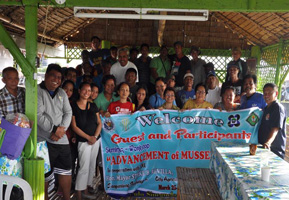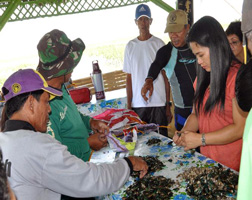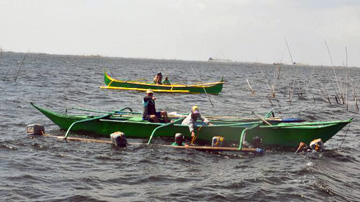 BACOOR CITY, CAVITE - The city’s mussel farmers and fisherfolk recently attended a seminar-workshop on the advancement of mussel culture.
BACOOR CITY, CAVITE - The city’s mussel farmers and fisherfolk recently attended a seminar-workshop on the advancement of mussel culture.
Held at Bantay Dagat Headquarters, Brgy. Sineguelasan, the seminar workshop was coordinated by the Philippine Council for Agriculture, Aquatic, and Natural Resources Research and Development of the Department of Science and Technology (DOST-PCAARRD) through the Council’s Inland Aquatic Resources Division (IARD).
The Cavite State University (CvSU) and the City Government of Bacoor City also assisted in coordinating the activity.
Thirty-eight participants from Talaba II, Maliksi I and III, Siniguelasan, Alima, Banalo, and coastal barangays of Bacoor City attended the activity.
The seminar-workshop focused on alternative mussel culture systems and the construction of alternative mussel culture technology.
Dr. Carlos Baylon of the University of the Philippines Visayas spoke about the current trends and world-class technology on mussel farming.
Baylon presented best practices in countries with developed mussel industries, such as New Zealand, Australia, Norway, Scotland, Spain, and Maine, United States. 
“These countries have local fabricators of metal rafts, floaters, specialized ropes and equipment like harvesters, tumblers, graders, and size and color sorters,” Baylon said.
Prof. Renato Diocton and Eduardo Polancos of Samar State University likewise demonstrated the step by step method in constructing the longlines from knot tying techniques, installation of buoys and floaters, sorting and bagging of mussel juveniles, monitoring, and befouling.
Applying what they have learned on the construction of the longline technique, the participants constructed their own 50-meter longline which was stocked with mussel juveniles and deployed it in the field.
The training equipped the participants with a practical technique that is adoptable to small-scale mussel farmers and provided them with a venue to unite for the development of the local mussel industry.
The seminar-workshop on the advancement of mussel culture is one of the many initiatives of PCAARRD in connection with Outcome One. Outcome One seeks to provide science-based know-how and tools that will enable the agricultural sector to raise productivity to world-class standards.
“Outcome One serves as DOST’s blueprint towards alleviating poverty in the agriculture and aquatic sectors as part of the government’s social contract with our people,” said DOST Secretary Mario G. Montejo in his message during one of the events of the Council.
 Montejo, during the same event, challenged the researchers to continually improve the share of the agricultural sector to the total economy by providing the farmers with productive and worthwhile technologies and by increasing the value of the country’s primary agricultural products through research and development.
Montejo, during the same event, challenged the researchers to continually improve the share of the agricultural sector to the total economy by providing the farmers with productive and worthwhile technologies and by increasing the value of the country’s primary agricultural products through research and development.
PCAARRD’s commitment to Outcome One was showcased by the Council in its participation to the National Science and Technology Week (NSTW) on July 24-28 at SMX Mall of Asia, Pasay City.
The 2015 NSTW adopted the theme Philippines: A Science Nation Innovating for Global Competitiveness.
PCAARRD, on the other hand, adopted the theme Strategic Industry S&T Program for Agri-Aqua Growth (SIPAG) ni Juan to bolster PCAARRD’s commitment to Outcome One which the Council pursues, through its Industry Strategic S&T Program (ISPs), hence the tagline SIPAG ni Juan.
